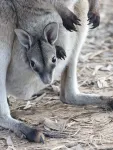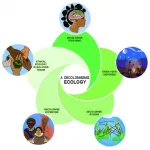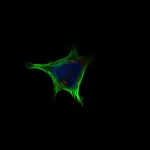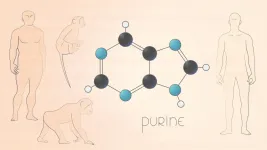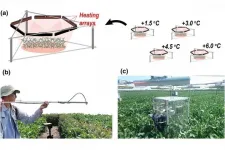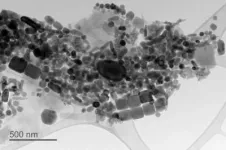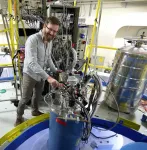New insight into when CAR T is effective against childhood leukaemia
2021-05-24
(Press-News.org) Scientists and clinicians at UCL and Great Ormond Street Hospital (GOSH) studying the effectiveness of CAR T-cell therapies in children with leukaemia, have discovered a small sub-set of T-cells that are likely to play a key role in whether the treatment is successful.
Researchers say 'stem cell memory T-cells' appear critical in both destroying the cancer at the outset and for long term immune surveillance and exploiting this quality could improve the design and performance of CAR T therapies.
Explaining the study, published in Nature Cancer, lead author Dr Luca Biasco (UCL Great Ormond Street Institute of Child Health), said: "During clinical trials we have seen some very encouraging results in young patients with leukaemia, however it's still not clear why CAR T-cells continue to be present in the long-term for some patients, stopping the cancer from returning, while others remain at a high risk of relapse.
"To ensure that a leukaemia treatment works any CAR T-cell therapy must have a prolonged effect on the way that the body recognises and removes cancer cells. In this study we tried to find the origin and nature of the T-cells that control these long-term responses."
In CAR T therapy, immune cells (T-cells) are genetically engineered to contain a molecule called a chimeric antigen receptor (CAR) on their surface which can specifically recognise cancerous cells.
Researchers assessed the CAR T-cells of patients involved in the CARPALL Phase I Study, which used a new CAR molecule known as CAT-19 developed between UCL Cancer Institute and UCL Great Ormond Street Institute of Child Health, for treatment in children with acute lymphoblastic leukaemia (ALL).
The team compared CAR T-cells from patients who still had CAR T-cells detectable in the blood more than two years after their treatment, with individuals who had lost their CAR T-cells in the one to two months post treatment.
Using a technique called 'insertion site barcoding', researchers were able to study the fate of different types of CAR T-cells in patients after they were given.
Corresponding author Professor Persis Amrolia, based at UCL Great Ormond Street Institute of Child Health and Consultant in Bone Marrow Transplant at GOSH, said: "Using this barcoding technique, we were able to see 'stem cell memory T-cells' play a central role both during the early anti-leukaemic response and in later immune surveillance, where the body recognises and destroys cancer cells.
"This suggests that this small sub-group of T-cells are critical to the long-term success of the therapy."
Researchers say, this work indicates that the teams caring for patients could measure the types of CAR T-cells present after some someone has had their anti-leukaemia therapy, to gain an indication of whether they will be able to preserve their CAR T-cells into the future, avoiding relapse.
Professor Amrolia added: "This new insight may help us to improve our CAR T-cell therapy and work out which patients are at a higher risk of relapse and may benefit from a stem cell transplant after CAR T-cell therapy."
Dr Biasco added: "It was extremely rewarding to see how the application of our new barcoding technology to study CAR T-cells is unveiling such important information about what happens to these cells after they are given to patients. We now plan to expand the technology we established at UCL and validate these findings in larger groups of patients."
Co-author Dr Martin Pule, who develops CAR T therapies at his lab at UCL Cancer Institute, said: "This research opens up new avenues to improve CAR design and manufacture, improving the performance of CAR T-cell therapy, to achieve a combination of early tumour clearance and long-term protection from relapses in patients with B cell leukaemia."
INFORMATION:
This research received funding by Wellcome Trust (Wellcome) and the National Institute for Health Research (NIHR). All research at Great Ormond Street is supported by the NIHR GOSH Biomedical Research Centre.
The UCL CAR T-cell programme is the most comprehensive in Europe, encompassing a broad-ranging portfolio of studies actively recruiting patients with B and T-cell malignancies, myeloma, and neuroblastoma. For more information: https://www.ucl.ac.uk/cancer/research/ucl-car-t-programme.
Note to Editors
For a copy of the paper or to speak with the researchers, please contact Rowan Walker T: +44 (0) 7986 463767 E: rowan.walker@ucl.ac.uk, or on Monday May 24, Mark Greaves T: +44 (0) 7990 675947 E: m.greaves@ucl.ac.uk
Research paper: Luca Biasco, Natalia Izotova, Christine Rivat, Sara Ghorashian, Rachel Richardson, Aleks Guvenel, Rachael Hough, Robert Wynn, Bilyana Popova, Andre Lopes, Martin Pule, Adrian J. Thrasher, Persis J. Amrolia, 'Clonal expansion of T memory stem cells determines early anti-leukemic responses and long-term CAR T cell persistence in patients', will be published in Nature Cancer on Monday 24 May 2021 at 4pm (London time), 11am (US Eastern Time).
The DOI for this paper will be: 10.1038/s43018-021-00207-7
About UCL - London's Global University
UCL is a diverse community with the freedom to challenge and think differently.
Our community of more than 41,500 students from 150 countries and over 12,500 staff pursues academic excellence, breaks boundaries and makes a positive impact on real world problems.
We are consistently ranked among the top 10 universities in the world and are one of only a handful of institutions rated as having the strongest academic reputation and the broadest research impact.
We have a progressive and integrated approach to our teaching and research - championing innovation, creativity and cross-disciplinary working. We teach our students how to think, not what to think, and see them as partners, collaborators and contributors.
For almost 200 years, we are proud to have opened higher education to students from a wide range of backgrounds and to change the way we create and share knowledge.
We were the first in England to welcome women to university education and that courageous attitude and disruptive spirit is still alive today.
We are UCL.
http://www.ucl.ac.uk| Follow @uclnews on Twitter | Watch our YouTube channel | Listen to UCL podcasts on SoundCloud | Find out what's on at UCL Minds | #MadeAtUCL
Find out how UCL is helping lead the global fight against COVID-19 http://www.ucl.ac.uk/covid-19-research
About Research at Great Ormond Street Hospital
Great Ormond Street Hospital is one of the world's leading children's hospitals with the broadest range of dedicated, children's healthcare specialists under one roof in the UK. The hospital's pioneering research and treatment gives hope to children from across the UK with the rarest, most complex and often life-threatening conditions. Our patients and families are central to everything we do - from the moment they come through the door and for as long as they need us.? All research at Great Ormond Street Hospital NHS Foundation Trust is made possible by the NIHR Great Ormond Street Hospital Biomedical Research Centre.
ELSE PRESS RELEASES FROM THIS DATE:
2021-05-24
A population of bridled nailtail wallabies in Queensland has been brought back from the brink of extinction after conservation scientists led by UNSW Sydney successfully trialled an intervention technique never before used on land-based mammals.
Using a method known as 'headstarting', the researchers rounded up bridled nailtail wallabies under a certain size and placed them within a protected area where they could live until adulthood without the threat of their main predators - feral cats - before being released back into the wild.
In an article published today in Current Biology, the scientists describe how they decided on the strategy to protect only the juvenile wallabies from feral cats in Avocet Nature Refuge, ...
2021-05-24
Knowledge systems outside of those sanctioned by Western universities have often been marginalised or simply not engaged with in many science disciplines, but there are multiple examples where Western scientists have claimed discoveries for knowledge that resident experts already knew and shared. This demonstrates not a lack of knowledge itself but rather that, for many scientists raised in Western society, little education concerning histories of systemic oppression has been by design. Western scientific knowledge has also been used to justify social and environmental control, including dispossessing colonised people of their ...
2021-05-24
Our brain is usually well protected from uncontrolled influx of molecules from the periphery thanks to the blood-brain barrier, a physical seal of cells lining the blood vessel walls. The hypothalamus, however, is a notable exception to this rule. Characterized by "leaky" blood vessels, this region, located at the base of the brain, is exposed to a variety of circulating bioactive molecules. This anatomical feature also determines its function as a rheostat involved in the coordination of energy sensing and feeding behavior.
Several hormones and nutrients are known to influence the feeding neurocircuit in the hypothalamus. Classic examples are leptin and insulin, both involved in informing the brain of available energy. In the last years, the ...
2021-05-24
Skoltech scientists and their colleagues from Germany and the United States have analyzed the metabolomes of humans, chimpanzees, and macaques in muscle, kidney, and three different brain regions. The team discovered that the modern human genome undergoes mutation which makes the adenylosuccinate lyase enzyme less stable, leading to a decrease in purine synthesis. This mutation did not occur in Neanderthals, so the scientists believe that it affected metabolism in brain tissues and thereby strongly contributed to modern humans evolving into a separate species. The research was published in the journal eLife.
The predecessors of modern humans split from their closest evolutionary relatives, Neanderthals and Denisovans, about 600,000 ...
2021-05-24
A new low-cost and sustainable technique would boost the possibilities for hospitals and clinics to deliver therapeutics with aerogels, a foam-like material now found in such high-tech applications as insulation for spacesuits and breathable plasters.
With the help of an ordinary kitchen freezer, this newest form of aerogel was made from all natural ingredients, including plant cellulose and algae, says Jowan Rostami, a researcher in fibre technology at KTH Royal Institute of Technology in Stockholm.
Rostami says that the aerogel's low density and favorable surface area make it ideal for a wide range of uses, ...
2021-05-24
CHAMPAIGN, Ill. -- Scientists report that it is possible to detect and predict heat damage in crops by measuring the fluorescent light signature of plant leaves experiencing heat stress. If collected via satellite, this fluorescent signal could support widespread monitoring of growth and crop yield under the heat stress of climate change, the researchers say.
Their study measures sun-induced chlorophyll fluorescence - or SIF - to monitor a plant's photosynthetic health and establish a connection between heat stress and crop yield. The findings are published in the journal Global Change Biology.
Sun-induced chlorophyll fluorescence occurs when a portion of photosynthetic energy, in the form of near-infrared light, is emitted from plant leaves, the researchers said.
"There ...
2021-05-24
Fifty-six million years ago, as the Earth's climate warmed by five to eight degrees C, new land mammals evolved, tropical forests expanded, giant insects and reptiles appeared and the chemistry of the ocean changed. Through it all, bacteria in the ocean in what is now New Jersey kept a record of the changes in their environment through forming tiny magnetic particles. Now, those particles and their record are all that's left of these microorganisms. Thanks to new research tools, that record is finally being read.
In research published in the journal Paleoceanography and Paleoclimatology, researchers including University of Utah doctoral student Courtney Wagner and associate professor Peter Lippert report the climate clues that can ...
2021-05-24
By making a game out of getting their daily steps, new research points to the possibility that people with diabetes could be nudged toward increasing their physical activity, with changes lasting for a full year. Since many now use apps or other digital means to manage their diabetes, this program - which utilized tools like wearable step counters and electronic scales with personalized goals - could potentially be integrated to help individuals achieve greater success. Findings from the study, conducted by a team from the Perelman School of Medicine ...
2021-05-24
Carbon is vital to the existence of all living organisms, since it forms the basis of all organic molecules that, in turn, form the basis of all living beings. While that alone is pretty impressive, it has recently found surprisingly novel applications in disciplines such as aerospace and civil engineering with the development of carbon fibers that are stronger, stiffer, and lighter than steel. Consequently, carbon fibers have taken over steel in high-performance products like aircrafts, racecars, and sports equipment.
Carbon fibers are usually combined with other materials to form ...
2021-05-24
Scientists studying a special kind of semimetals have found a material with an unusually pristine nature that could be crucial for developing powerful new quantum technologies and discovering new phases of matter.
In an open access paper published in Science Advances, Johns Hopkins physicists and colleagues at Rice University, the Vienna University of Technology (TU Wien), and the National Institute of Standards and Technology (NIST), present experimental evidence of naturally occurring quantum criticality in a material.
Criticality is the point at which a material hovers between two phases--like the slushy transition between water and ice--without ever settling. Useful materials often exploit this point. For example, air conditioners use compressors to change refrigerant ...
LAST 30 PRESS RELEASES:
[Press-News.org] New insight into when CAR T is effective against childhood leukaemia
